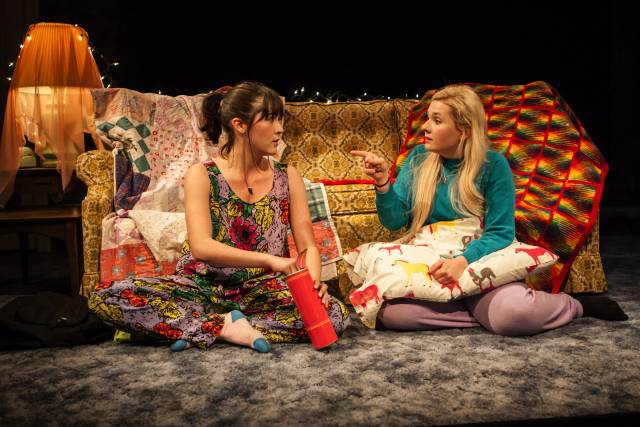

Raging hormones meet unexpected terror in the world premiere of writer/director Erica Schmidt’s All the Fine Boys, presented by the New Group at The Pershing Square Signature Center.
In truth, this is not a play about friendship, but it introduces itself thus; brassy outsider Jenny and new-ish to town, burgeoning intellectual Emily gather in the former’s basement for a sleepover with all the proper, 14-year-old girl trappings -- horror movies, junk food, gossip, discussion of dreams and developing bodies. A game of truth or dare quickly establishes that the girls have sex on the brain. Or at least, they have what they think is sex on the brain (Breslin’s haughty description of the particulars of ‘coom’-- as explained to her in the girl’s bathroom -- is relatable, cringeworthy, and endearing).
Jenny pines for the vagaries and freedoms of adulthood. She’s waiting for someone from Star Search to walk into her class and whisk her away to… Well, O.K., she’s not sure where, but she knows wherever it is will be better than suburban South Carolina’s Okra Festivals, church parties and stuck up dance team girls (who did make it to Star Search). The object of Emily’s desire is far more concrete; she’s the only middle schooler in the high school play, and she’s sure she loves Adam, the much sought after, experienced senior star.
At well under two hours, about the length of your average, teen B-Movie, the play passes quickly, but muddles time a bit in its effort to tell the girls’ love (lust?) stories in crosscut action, Emily with Adam and Jenny with Joseph, an older man from her family’s church.

From the occasionally clunky metaphors to the mostly surface level trappings of late '80s nostalgia (bold prints abound and a top-40 playlist from the era ebbs and flows throughout), it would be a stretch to call any aspect of the play subtle, but the work is, nonetheless, powerful or, perhaps more accurately put, disturbing. The girl’s distance heightens the increasing isolation of the rest of the play, which suddenly careens headfirst into unspeakable territory. More than once, I realized my entire body was tense with dread and discomfort.
Despite preview performance jitters and stumbles, the couples deliver strong performances and find an engaging, if at turns problematic, chemistry. Those familiar with Abigail Breslin’s character in FX’s campy slasher series, Scream Queens, will see parallels in her brave rendering of awkward, fast talking Jenny, far more vulnerable -- and more of a child -- than she lets on.
Audiences will squirm and seethe at her scenes with deceptively timid, 28-year-old Joe, played with tightly coiled masculinity and hypocritical piousness by Joe Tippett. Jenny is so eager for “stuff to happen now,” that she's a perfect, willing victim, blind to the possible dangers of her liaison; “you're no stranger,” she explains to him between mouthfuls of Pringles and Twizzlers, her favorites foods which make for sweet, childish demands. “You’re too good looking to be bad.”

His character is so recognizable in the pantheon of teen mythology, that even possible flubs (a fumble with a box of toothpicks, for example) only serve to strengthen his rendering of a young man affecting world-weariness. His spell is strong enough to balance Isabelle Furhman’s sweet but inconsistent efforts as Emily, the character who seems to serve as the play’s emotional and moral touchstone.
All the Fine Boys is a powerful indictment against our inability to make room for and attempt to understand teen, female sexuality, especially within the rigid mores of the Church. Twizzlers; bikes; scary movies; sleepovers -- these should be the preoccupations of 14 year olds. The adult world barges in strong enough, soon enough.